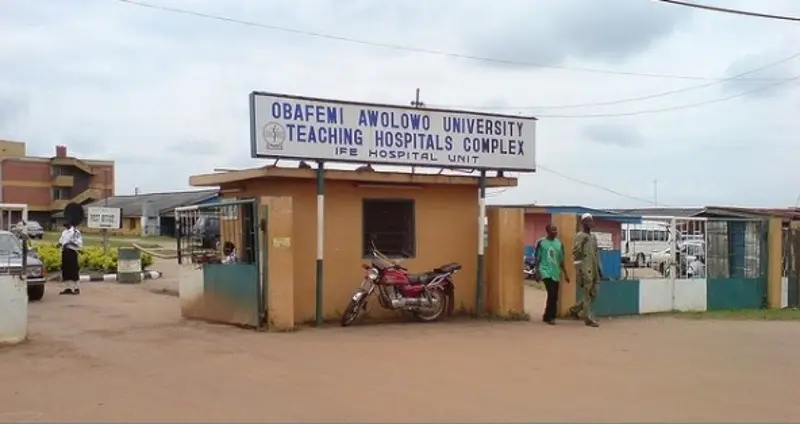Over 500 former employees of the Obafemi Awolowo University Teaching Hospitals Complex (OAUTHC) in Ile-Ife, Nigeria, have taken legal action against the hospital’s management, alleging the unlawful termination of their employment. These employees, represented by their legal counsel, Sola Ojutalayo, are seeking both reinstatement to their positions and the payment of their outstanding entitlements, which they claim were denied following their abrupt dismissal.
The case, which has attracted considerable attention, is being heard at the National Industrial Court in Ibadan, Nigeria. The claimants argue that they were employed by the hospital between October and December of 2022, but on January 31, 2024, they were allegedly dismissed without any formal explanation or due process. The abruptness of their termination, they contend, not only lacked transparency but also violated their rights as employees. The claimants have brought the matter before the National Industrial Court in an attempt to seek justice and hold the hospital accountable for what they describe as an unlawful and unjustified action.
The Legal Action: Claim for Reinstatement and Entitlements
The plaintiffs’ legal counsel, Sola Ojutalayo, has made it clear that the workers are seeking more than just compensation. The primary demand is for their reinstatement, with the workers insisting that they were unfairly dismissed without just cause or proper procedure. In addition to reinstatement, the workers are demanding payment of all their outstanding entitlements, including salaries and other benefits that they claim have not been settled.
The claimants argue that they were employed in the latter part of 2022, between October and December, with full expectations of stable employment. However, they were informed of their termination on January 31, 2024, without receiving any prior notice or explanation for the decision. According to Ojutalayo, the employees were not given a fair opportunity to defend themselves or understand the reasons behind their dismissal, which is a violation of standard labor practices.
The case centers on what the workers describe as an arbitrary dismissal, made without any form of due process. The workers maintain that the hospital did not adhere to legal or institutional procedures in terminating their contracts, which is a core issue that the National Industrial Court will need to address.
The Court Hearing: Presentation of Evidence
During the hearing held on Tuesday, the claimants presented several exhibits as evidence of their claims. Four key exhibits were brought to the court’s attention, including documents that detailed the claimants’ employment dates and the salaries that had been agreed upon at the time of their hiring. These exhibits were intended to provide concrete proof of the claimants’ employment agreements and the financial obligations of the hospital management.
However, the defense team representing the hospital, led by counsel Ejike Orji, raised objections to the admissibility of two of the four exhibits. Orji contended that the documents were invalid due to being unsigned, which he argued would make them legally insufficient as evidence. This objection raised concerns over the validity of the claimants’ documentation and could have potentially jeopardized their case.
In response, Sola Ojutalayo, the legal representative for the claimants, countered that Orji had only reviewed the first pages of the exhibits and had overlooked the signatures that appeared on subsequent pages. Ojutalayo argued that the documents were properly signed and valid, as the signatures appeared on later pages, which addressed the concerns raised by the defense.
Ruling on the Admissibility of Exhibits
Justice John Peters, the presiding judge, ruled in favor of the claimants by admitting the contested exhibits as valid evidence. He confirmed that the documents were duly signed and relevant to the case, which allowed the claimants to move forward with presenting their argument. The documents provided key details about the terms of employment, including the claimants’ salaries, which were central to their claims for compensation and reinstatement.
In his ruling, Justice Peters highlighted that the exhibits were crucial for understanding the terms of the claimants’ employment and the financial obligations the hospital had toward them. The documents presented by the claimants helped substantiate their allegations that they had been unjustly treated and that they were owed significant entitlements. By accepting the exhibits, the judge allowed the claimants to continue their legal pursuit with stronger evidence in their favor.
Witness Testimony: Samson Ogunleye’s Account
To further support their case, the claimants called upon one of their own members, Samson Ogunleye, to testify in court. Ogunleye’s testimony added a personal and emotional dimension to the legal proceedings, as he provided firsthand details of his experience during his employment at OAUTHC and the subsequent dismissal.
Ogunleye testified that he was not hired on a probationary basis, contrary to any claims made by the hospital’s management. He also explained that he was unaware of any waivers or special considerations granted to other employees by the head of service, which might have explained why his own dismissal was handled differently.
Importantly, Ogunleye stated that he had not received any salary payments since the start of his employment, which further bolstered the claimants’ argument that they were owed significant financial compensation. Ogunleye’s testimony painted a picture of employees who had been left in the dark about their employment status and denied the basic rights that come with being a worker.
Ogunleye also testified that the hospital management had not provided any explanation for the termination of his employment or that of his colleagues. This lack of transparency and communication, he argued, was another indication that the termination was arbitrary and unjust. His statement resonated with the other claimants, who have similarly been left without answers regarding why their contracts were suddenly terminated.
Defense’s Objection and Further Legal Proceedings
The defense team, led by Ejike Orji, continued to object to the claims made by the former employees, maintaining that the termination was justified. However, the primary issue at hand is whether the dismissal followed the proper legal channels and whether the employees were given due process in the termination of their contracts. The case hinges on whether the hospital acted in accordance with Nigerian labor laws and whether it treated its employees fairly.
Despite the objections raised by the defense, the legal proceedings are set to continue. Justice Peters adjourned the case to February 11, 2024, giving both parties additional time to present their arguments and evidence. This adjournment allows for further exploration of the legal issues involved and offers both sides the opportunity to refine their respective cases.
The Impact of the Case: A Call for Justice and Fairness
This case has drawn attention not only because of the number of employees involved but also because it highlights broader concerns about the treatment of workers in the Nigerian healthcare sector. With over 500 claimants, the case has the potential to set a significant legal precedent for workers’ rights and labor relations in Nigeria.
For the workers involved, the case represents more than just a fight for compensation or reinstatement—it is a call for justice and accountability. The employees are not only seeking their entitlements but also hoping to bring attention to what they see as a systemic issue within the hospital management. The hospital’s failure to provide adequate explanations for the terminations has left many of the workers feeling disillusioned and disenfranchised, which is why they have chosen to take legal action.
The case could also have far-reaching implications for labor law in Nigeria. If the claimants are successful in their pursuit of justice, it could set a new standard for how similar cases are handled in the future. It would send a message that employees, regardless of their position or sector, have the right to fair treatment and due process when it comes to the termination of their employment.
Looking Ahead: The Future of the Claimants and the Hospital
As the case moves forward, the former employees of OAUTHC are waiting anxiously for the next hearing, hoping that the court will rule in their favor. If successful, the claimants will not only receive compensation and reinstatement but will also have played a key role in advocating for workers’ rights within the healthcare sector.
The outcome of this case will also have significant consequences for the management of OAUTHC. The hospital’s reputation is on the line, and the court’s ruling could either validate its actions or force it to rectify what many see as an injustice. The hospital management must now prepare for the possibility of a legal defeat, which could force them to reconsider their approach to employment practices and labor relations.
Ultimately, the case between the former employees of OAUTHC and the hospital management is not just a legal battle—it is a symbol of the ongoing struggle for fair treatment in the workplace. As the hearings continue, all eyes will be on the court to see how justice will be served and whether the workers will receive the compensation and recognition they deserve.




